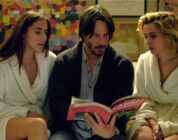Filmmaker Julia Max uses the horror genre to tell a unique story about the emotional complexity of death and grief with the film The Surrender (available to stream on Shudder). Written and directed by Max, the story begins as Megan (Colby Minifie) and Barbara (Kate Burton) are caring for their family’s dying patriarch Robert (Vaughn Armstrong), trying to manage the stress of being caregivers. But when he dies, Barbara tries bring him back from the dead.
While Max really leans into the genre with the film’s supernatural elements and the impactful level of gore, the story actually stems from a personal place for the filmmaker. Max took inspiration from the death of her own stepfather and her family having to move into the roles of caregivers.
Additionally, Max’s mother actually hired a death doula to assist in navigating her stepfather’s death. But don’t worry, the outcome wasn’t the same as the events of the film. There was, however, a question of what would happen if a similar experience took a dark turn.
‘Mother-daughter relationships are so ripe for the horror genre’
As Max explained, the script actually began in quite a different place.
ADVERTISEMENT
“What happened was, after [my stepfather] passed away, I remember going to the kitchen and I saw the front door was ajar, and I was just like, oh that’s not good. I wonder how long it’s been like that. What if someone came in and robbed us while we were going through this?,” Max told Yahoo. “So initially, this kind of started as a weirder story that involved robbers.”
“And it was my husband, Ian McDonald, he was just like, ‘The robber stuff is fine and everything, but the mother-daughter stuff is far more interesting. … I think you should just make it about that.’ And so that kind of gave me the confidence to just lean into that. And it was really, really wonderful, because I got to make it much more personal and focused on our actual experiences, as opposed to going totally off the walls.”
The heart of The Surrender is really this engaging family drama, as Max really showcases the relationship dynamics and complexity between Megan and Barbara.
“I feel like mother-daughter relationships are so ripe for the horror genre,” Max said. “They are so complicated and fraught, and I feel like we don’t see that relationship explored enough.”
But to really raise the bar in terms of giving the audience a real experience of tension and claustrophobia is the use of sound. It’s a great accompaniment to the chilling story you watch unfold.
ADVERTISEMENT
“Our composer [Alex Winkler] did some truly phenomenal work on this,” Max highlighted. “The music so sets the tone emotionally and I think he perfectly nailed the feeling, without overwhelming and stealing focus from the scene.”
“There were quite a few moments where I was like, ‘Oh, I think this moment should be silent.’ And then he came up with something and I was like, ‘Nope, that works better. Let’s do that. Love it.’ And then, of course, once you start playing with the whole sound mix and everything, it was really interesting and fun, getting to choose what moments you want to highlight with sound, and when to pull back a bit. And I think throughout the whole process, with the sound, the prosthetics, the effects, I think usually pulling back works better than showing too much.”
While not completely unheard of, but often skipped, Max and her cast did have a rehearsal process before filming. As Max highlighted, it was an effective way to establish this relationship between Megan and Barbara, particularly essential in a film that tries to ground itself in the real complexity of their circumstances.
“Personally, I think getting that rehearsal … actually saves so much time on set, because instead of trying to work through the scene or being like, ‘Wait, this isn’t quite working for me. … We should adjust this line, but that has a domino effect over here, and we’ve already shot that.’ … Sometimes when you try to do a deep dive into the scene study on set, getting to do that before we started filming allowed the actors to really take the characters and make them their own,” Max said.
ADVERTISEMENT
“We were able to kind of shift and adjust the characters so that they really felt authentic to Colby Minifie and Kate Burton, who were so wonderful. And I think their performances were absolutely enhanced by getting to spend that time with each other and getting to build that connection in advance. As opposed to having to try to mimic this mother-daughter relationship the day that they first meet. That’s asking a lot.”
In terms of staying grounded in reality, that really extended to what these characters look like. We’re so used to seeing grieving women in movies with perfectly set blowouts and meticulously crafted makeup, but Max was ready to show something far more reflective of real life.
“One of the things that is always kind of a pet peeve of mine, to be perfectly honest, it’s when you see, whether it’s a movie or a TV show, it’s a post-apocalyptic world, but the women are wearing flawless makeup, and they’re perfectly shaved and groomed,” Max said. “What woman would be doing this in the midst of a zombie apocalypse?”
“So for me, it was so important that this feel as authentic as possible. These two women are grieving. They’re not leaving the house. They haven’t showered. They are not going to be in beautiful, perfect makeup. They’re not going to have done their hair, they’re not going to be wearing stilettos or tight clothing. They are going to be in comfortable pyjamas. … I mean, when my mom and I were going through this, we were gross as hell. We were not looking our finest.”
‘I never saw female directors or writers on set’
Max identified that going through the process of writing The Surrender helped her with her own grief, by “stepping back” and looking at it through the lens of characters and a fictional story. And she felt that by the end, the characters in the film had become “their own.”
ADVERTISEMENT
Looking at her career more broadly, Max is really happy about creating in the horror genre.
“I love horror because I feel like it encompasses all the other genres,” Max said. “You’ve got horror comedies, you’ve got slow burn horror, which really can feature more dramatic elements, and then you’ve got like fun slasher.”
“There’s so many different types and I really feel like horror allows you to explore a way into your subject matter, while still keeping them fun and enjoyable. Whereas if it was just a straight drama, it would just be too heavy-handed for sure.”
Being raised by parents in the film industry, growing up in Los Angeles, you may think that means Max always thought she was going to be a filmmaker. But women being pushed aside for director and writer roles really impacted Max’s perception of what she could really do in the industry.
“I grew up on film sets and I always loved writing, and I love storytelling, but I never saw female directors or writers on set,” Max shared. “The only thing I would ever see women doing was acting or doing hair and makeup, or costumes.”
“And so I was like, oh I guess those are the only options for us. And so it really wasn’t until much later in my life where we started seeing much more visibility of female filmmakers and writers that I was like, ‘Oh my gosh, I’m allowed to do this. I can do this.’ … Finally kind of pivoting away from acting, which I tried for a while, because I really liked exploring characters, but it wasn’t very fulfilling, and it’s such a demoralizing process, auditioning. I have such respect for actors. It’s so hard. But kind of deciding that I didn’t want to do that, and I really wanted to pursue writing and directing, was the best decision I’ve ever made. And yes, this is what I love doing, and what I want to do for the rest of my life.”
Above and beyond her on personal journey, Max remains committed to helping the next generation of women striving to be writers and directors.
“It’s been really wonderful getting to meet more women who want to be filmmakers and writers, and anytime I meet someone who’s up and coming I’m like, ‘Oh my gosh, let me please help you in any way I can!’ Because I want there to be more of us,” Max said.
“I very much feel like this is the time for female filmmakers in horror, and I am so excited to see what new voices come up in the next few years and what they bring to the table.”




